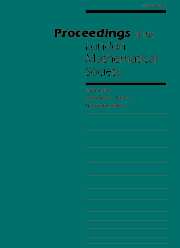Crossref Citations
This article has been cited by the following publications. This list is generated based on data provided by
Crossref.
Castro, Francis N.
Rubio, Ivelisse
Randriam, Hugues
Moreno, Oscar
and
Mattson, H. F.
2006.
An Elementary Approach to Ax-Katz, McEliece's Divisibility and Applications to Quasi-Perfect Binary 2-Error Correcting Codes.
p.
1905.
Adolphson, Alan
and
Sperber, Steven
2009.
Exponential sums nondegenerate relative to a lattice.
Algebra & Number Theory,
Vol. 3,
Issue. 8,
p.
881.
Katz, Daniel
2009.
Point count divisibility for algebraic sets over ℤ/𝕡^{ℓ}ℤ and other finite principal rings.
Proceedings of the American Mathematical Society,
Vol. 137,
Issue. 12,
p.
4065.
Castro, Francis N.
Randriam, Hugues
Rubio, Ivelisse
and
Mattson, H.F.
2010.
Divisibility of exponential sums via elementary methods.
Journal of Number Theory,
Vol. 130,
Issue. 7,
p.
1520.
Blache, Régis
2012.
Valuation of exponential sums and the generic first slope for Artin–Schreier curves.
Journal of Number Theory,
Vol. 132,
Issue. 10,
p.
2336.
Castro, F.
and
Castro-Velez, F.N.
2012.
Improvement to Moreno–Morenoʼs theorems.
Finite Fields and Their Applications,
Vol. 18,
Issue. 6,
p.
1207.
Gologlu, Faruk
Lisonek, Petr
McGuire, Gary
and
Moloney, Richard
2012.
Binary Kloosterman Sums Modulo 256 and Coefficients of the Characteristic Polynomial.
IEEE Transactions on Information Theory,
Vol. 58,
Issue. 4,
p.
2516.
2013.
Handbook of Finite Fields.
p.
777.
Adolphson, Alan
and
Sperber, Steven
2014.
Hasse invariants and mod p solutions of A-hypergeometric systems.
Journal of Number Theory,
Vol. 142,
Issue. ,
p.
183.
Castro, Francis N.
González, Oscar E.
and
Medina, Luis A.
2015.
A divisibility approach to the open boundary cases of Cusick-Li-Stǎnicǎ’s conjecture.
Cryptography and Communications,
Vol. 7,
Issue. 4,
p.
379.
Castro, Francis N.
Figueroa, Raúl
and
Guan, Puhua
2017.
p-adic Valuation of Exponential Sums in One Variable Associated to Binomials.
Uniform distribution theory,
Vol. 12,
Issue. 1,
p.
37.
Castro, Francis N.
and
Figueroa, Raúl
2017.
p-adic valuation of exponential sums associated to trinomials and some consequences.
p-Adic Numbers, Ultrametric Analysis and Applications,
Vol. 9,
Issue. 4,
p.
257.
Arce-Nazario, Rafael
N. Castro, Francis
and
Ortiz-Ubarri, Jose
2017.
On the covering radius of some binary cyclic codes.
Advances in Mathematics of Communications,
Vol. 11,
Issue. 2,
p.
329.
Castro, Francis N.
and
Medina, Luis A.
2017.
Modular periodicity of exponential sums of symmetric Boolean functions.
Discrete Applied Mathematics,
Vol. 217,
Issue. ,
p.
455.
Arce-Nazario, Rafael A.
Castro, Francis N.
González, Oscar E.
Medina, Luis A.
and
Rubio, Ivelisse M.
2018.
New families of balanced symmetric functions and a generalization of Cusick, Li and Stǎnicǎ’s conjecture.
Designs, Codes and Cryptography,
Vol. 86,
Issue. 3,
p.
693.
Castro, Francis N.
Gonzalez, Oscar E.
and
Medina, Luis A.
2018.
Diophantine Equations With Binomial Coefficients and Perturbations of Symmetric Boolean Functions.
IEEE Transactions on Information Theory,
Vol. 64,
Issue. 2,
p.
1347.
Castro, Francis N.
González, Oscar E.
and
Medina, Luis A.
2019.
An improvement to Chevalley's theorem with restricted variables.
Finite Fields and Their Applications,
Vol. 58,
Issue. ,
p.
216.
Baoulina, Ioulia
Bishnoi, Anurag
and
Clark, Pete
2019.
A generalization of the theorems of Chevalley-Warning and Ax-Katz via polynomial substitutions.
Proceedings of the American Mathematical Society,
Vol. 147,
Issue. 10,
p.
4107.
Cao, Wei
and
Wan, Daqing
2023.
Divisibility on point counting over finite Witt rings.
Finite Fields and Their Applications,
Vol. 91,
Issue. ,
p.
102254.
Bertram, Noah
Deng, Xiantao
Haessig, C. Douglas
and
Li, Yan
2023.
Partial zeta functions, partial exponential sums, and p-adic estimates.
Finite Fields and Their Applications,
Vol. 87,
Issue. ,
p.
102139.




